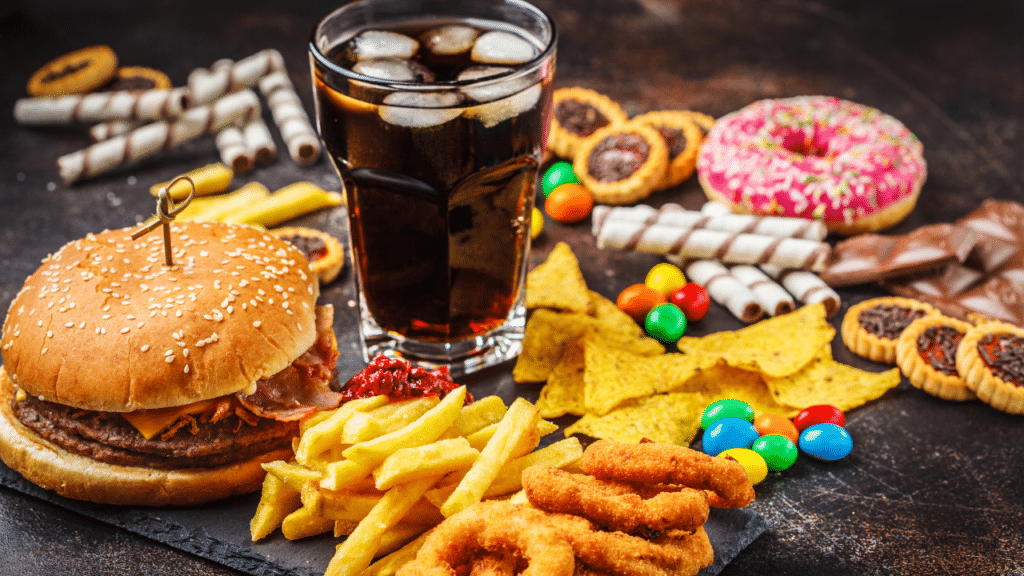|
Getting your Trinity Audio player ready...
|
Takeaways
- Heather Sandison, ND, is an expert in Alzheimer’s Disease treatment. She recommends that you prioritize eating nutrient-rich, whole foods while avoiding fast foods and processed foods.
- Understand that sugary drinks like soda and carb-heavy processed foods can harm metabolism and brain function.
- Your diet is a gateway to protecting yourself from Alzheimer’s disease and cognitive decline. Gluten, sugars, fast foods, and alcohol are all things you consume that increase your risk of developing Alzheimer’s disease.
In our quest for good health, the state of our brains should never be overlooked. Alzheimer’s disease is a growing concern. The Center for Disease Control reports that the number of people living with Alzheimer’s disease will triple by 2060.
So how can we prevent that? Believe it or not, we can use food because what we eat can help preserve our cognitive abilities.
In this blog, we’ll break down the five foods you should steer clear of to reduce the risk of Alzheimer’s disease. Let’s explore these dietary choices that can make a substantial impact on your brain’s well-being, as recommended by Alzheimer’s disease expert Heather Sandison, ND.
1. Fast Food: A Brain Health Nemesis

According to the American Academy of Neurology, fast food is a primary culprit when it comes to undermining brain health. One study found that consuming fast food could lead to a 28% increased risk of developing cognitive decline.
Dr. Heather Sandison, a renowned expert in the field, emphasizes the importance of eliminating fast food from your diet entirely.
According to her, “We want whole rich foods that are highly nutrient-dense, and you don’t get these at your common fast food chains, so just eliminate that. You no longer should eat at those restaurants; they’re not good for your health, not for your brain health, not for your heart health, and not for longevity. So eliminate fast foods today!”
2. Soda: The Sweet Sip to Avoid
Soda, whether laden with artificial sweeteners or packed with sugar, is a beverage that should be banished from your diet if you’re aiming to prevent or reverse cognitive decline. A key scientific review found that soda consumption can cause you to develop poor memory.
Dr. Sandison points out that, “Soda should not be consumed, whether it is diet soda with the fake sugars or the artificial sugars, or the regular sugars that come in bolus doses at very high levels.”
She explains that this excessive sugar intake confuses our metabolism and causes harm to our liver. This can lead to insulin resistance and a lack of sensitivity to sugar. Over time, this can result in a harmful buildup of sugar in the bloodstream.
Dr. Sandison further cautions against diet sodas, stating that they “trick our brains into thinking that they’ve gotten some sugar but without getting us the satisfaction of that sugar,” ultimately leading to cravings and potential health issues. This claim is supported by a thorough scientific review.
3. Packaged Foods: Unpacking the Risks
Packaged foods with lengthy ingredient lists and high carbohydrate content can hinder your quest for optimal brain health. Recent research shows avoiding eating ultra-processed foods may protect you from dementia. Dr. Sandison advises, “What we really want is to be in that ketogenic state, and most processed foods are going to keep you out of ketosis.”
When grocery shopping, she suggests avoiding the aisles where processed items reside and opting for fresh unprocessed foods, as they are more likely to be rich in essential nutrients.

4. Gluten: The Inflammatory Culprit
According to recent studies, gluten, a protein found in wheat, can be a source of inflammation for many, even those without celiac disease. Dr. Sandison advises against consuming wheat-based products such as pasta, bread, and cereals to reduce inflammation and promote gut health.
She explains that even those without celiac disease can experience responses to gluten that include inflammation and leaky gut, which can have downstream effects inhibiting optimal cell function throughout the body.
Dr. Heather Sandison recommends considering alternatives like:
- Quinoa
- High-quality rice
- Amaranth
- Other ancient grains that are lower in gluten or entirely gluten-free
5. Alcohol: A Cognitive Adversary

Alcohol, in essence, is a toxin that has been reported to have negative effects on cognitive health. Dr. Heather Sandison states, “No matter how you slice it, alcohol is toxic – it’s a poison.” While some cultures include small amounts of alcohol in their diets, she warns against excessive consumption, particularly in combination with sugary beverages.
Dr. Sandison’s advice is clear: “Eliminating all forms of alcohol, including wine, beer, and spirits, is advisable for those dealing with cognitive decline.”
Summary
Maintaining a diet that prioritizes brain health is crucial in the battle against Alzheimer’s disease and cognitive decline. By steering clear of fast food, soda, packaged foods, gluten, and alcohol, you can take significant steps toward preserving your cognitive abilities and promoting long-term brain wellness.
Make these dietary changes today for a healthier tomorrow!
For more information, check out our YouTube Channel filled with free tips and valuable insights about how you can prevent and even reverse Alzheimer’s disease and other forms of dementia.
If you want even more information about how to prevent or reverse cognitive decline, visit the Reversing Alzheimer’s Summit 3.0.

- Access the Reverse Alzheimer’s Summit 4.0
Learn from top leaders in the field the skills you need today.
DrTalks Videos About Dieting
Digesting the Gut – Brain Connection
Liberate Yourself From Binge Eating
References
Center for Disease Control and Prevention. (2020). Alzheimer’s Disease and Related Dementias. CDC.gov. Read it here.
Philip, A., & White, N. D. (2022). Gluten, Inflammation, and Neurodegeneration. American journal of lifestyle medicine, 16(1), 32–35. Read it here.
American Academy of Neurology. (2022, July 27). Eating More Ultra-Processed Foods Associated With Increased Risk of Dementia. Press release. Read it here.
Gomes Gonçalves, N., Vidal Ferreira, N., Khandpur, N., Martinez Steele, E., Bertazzi Levy, R., Andrade Lotufo, P., Bensenor, I. M., Caramelli, P., Alvim de Matos, S. M., Marchioni, D. M., & Suemoto, C. K. (2023). Association Between Consumption of Ultraprocessed Foods and Cognitive Decline. JAMA neurology, 80(2), 142–150. Read it here.
Anjum, I., Jaffery, S. S., Fayyaz, M., Wajid, A., & Ans, A. H. (2018). Sugar Beverages and Dietary Sodas Impact on Brain Health: A Mini Literature Review. Cureus, 10(6), e2756. Read it here.
Solan, M. (2022, November 1). Cutting Back on Ultra-Processed Foods Linked with Lower Dementia Risk. Harvard Men’s Health Watch. Read it here.
Rehm, J., Hasan, O. S. M., Black, S. E., Shield, K. D., & Schwarzinger, M. (2019). Alcohol use and dementia: a systematic scoping review. Alzheimer’s research & therapy, 11(1), 1. Read it here.

